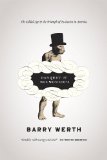Summary | Excerpt | Reviews | Beyond the Book | Readalikes | Genres & Themes | Author Bio
Great Minds, the Gilded Age, and the Triumph of Evolution in America
by Barry Werth

Critics' Opinion:
Readers' Opinion:
First Published:
Jan 2009, 400 pages
Paperback:
Apr 2011, 400 pages
 Book Reviewed by:
Book Reviewed by:
Micah Gell-Redman
Buy This Book
Agassiz’s faith in special creation informed his worldview. He believed
the Almighty made species separately and successively, dismissing evolutionary
theory as "folly." If species descended from other species through
slight modification, as Darwin himself was forced to acknowledge, there
ought to be fossil remains of "innumerable transitional forms," yet no scientist
had ever found one. Agassiz believed that his discovery of the Ice
Age amply explained the disappearance of some older extinct species and
the emergence of more recent ones, and that in nature there existed specific
"zoological provinces" with distinct plants and animals and "varieties"
of men, also created separately. In other words, humans were all one
species, but races from different zones did not share a common ancestry.
He interpreted the history of man by the same logic he applied to the origin
of plants and animals, and though such reasoning had become harder
and harder to defend, he remained the nation’s foremost creationist and
intellectual critic of Darwin and Spencer.
During the worst of his illness, Agassiz despaired of ever working
again. All around him his celebrated friends seemed to be faring little or
no better, sundered by age and grief. "The year ends with a club dinner,"
his neighbor Longfellow wrote dismally in his journal on December 31.
"Agassiz was not well enough to be there. But Emerson and Holmes of
the older set were, and so I was not quite alone." Headlong change during
and since the war had overtaken everything, especially America’s old
guards and ideas. Longfellow, once a glamorous figure in Cambridge with
his flowing hair, flowered waistcoats, and yellow gloves, had published his
most important poems twenty years earlier. In 1861 his wife was sealing
packages of their children’s curls with matches and wax when they burst
into flame, killing her. Longfellow suffered severe burns to his own face
and hands as he tried to save her, and with shaving painful and difficult,
grew a biblical beard. Deeply withdrawn, he spent much of his last
decade in Europe, translating Dante.
"It is time to be old, / To take in sail," wrote Emerson, still physically
vigorous but with his own fiery mind lost, more and more, to senility.
Agassiz would not take in sail. As his health returned through the early
winter, he grew restless and impatient. He raised public and private
subscriptions for the one project at Harvard he still controlled, the Museum
of Comparative Zoology, which his son, Alexander, an accomplished
naturalist in his own right, had managed in his absence. Then,
in mid-February, he received a letter from Benjamin Peirce, a Harvard
mathematician, astronomer, and fellow Lazzarono who served as superintendent
of the U.S. Coast Survey, which for more than two decades had
put its resources at Agassiz’s disposal for research in marine biology.
"Now, my dear friend, I have a very serious proposition for you," Peirce
wrote. "I am going to send a new iron surveying steamer round to California
in the course of the summer. She will probably start at the end of
June. Would you go in her, and do deep-sea dredging all the way round?"
Here lay a route out of Agassiz’s morass: his growing isolation at Harvard,
his need to do original research to resume a place at the forefront of
postwar science, his craving for a change of atmosphere after a year as a
shut-in, the yawning imperative - shared by all scientists - of new experiments,
new technologies, new data, new worlds to examine. Indeed: a future.
That the journey would take him down the east coast of South
America, up the west, and through the Galápagos Islands - virtually the
same voyage taken by Charles Darwin aboard HMS Beagle four decades
earlier - went unsaid, but could not fail to ignite his spirit and ambitions.
Assuredly the one person in America who could slow the juggernaut of
liberal science, Agassiz relished having a last chance to again dominate
the fray.
Excerpted from Banquet at Delmonico's by Barry Werth. Copyright © 2009 by Barry Werth. Excerpted by permission of Random House, a division of Random House, Inc. All rights reserved. No part of this excerpt may be reproduced or reprinted without permission in writing from the publisher.





The Funeral Cryer by Wenyan Lu
Debut novelist Wenyan Lu brings us this witty yet profound story about one woman's midlife reawakening in contemporary rural China.
Your guide toexceptional books
BookBrowse seeks out and recommends the best in contemporary fiction and nonfiction—books that not only engage and entertain but also deepen our understanding of ourselves and the world around us.